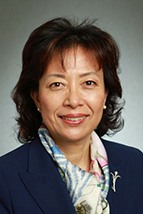When a dispute arose about internet domain names in Africa, with a South African nonprofit and 55 nations locked into a decade-long legal battle with a Walnut Creek, California, entrepreneur, where did it end up in court? In Los Angeles, of course.
The case involved the arcane governance of the World Wide Web, political and economic considerations on another continent, and intricacies of arbitration and litigation. But it was resolved by the California Court of Appeal on a simple principle: you can’t argue one way during a dispute and then argue the exact opposite way later. (DotConnectAfrica Trust v. ZA Central Registry.)
Key to the internet are the domain names that identify websites, such as VRMlaw.com, Google.com, IRS.gov, and more than 300 million others. The part of the name after the period or dot, such as com, org, biz, net and, in other countries, ca, ru, uk, au and so on, is called the “top-level domain,” or TLD.
Since 1998, the task of managing the explosively growing ranks of domain names has been handled by ICANN, the Internet Corporation for Assigned Names and Numbers. ICANN’s responsibilities also include overseeing the creation of new TLDs.
It assigns these TLDs to registrars. These companies license domains to individuals and organizations, collecting fees that in the aggregate can be substantial. In addition, registrars control access to names that can have significant branding and emotional importance.
In 2006, Sophia Bekele, who was born in Ethiopia and moved to the United States as a teenager, had the idea for a .africa TLD, similar to the .asia TLD that was already in use. She formed a nonprofit organization, DotConnectAfrica Trust, in Mauritius, with offices in Kenya. (The appellate court shortened the name to DotConnect.)
In 2009, Bekele and DotConnect received a letter of support from the African Union Commission, which represents 55 countries in Africa.
Competition quickly emerged when ZA Central Registry, a technology nonprofit based in South Africa, expressed interest in becoming the registrar for the .africa TLD.
In 2010, the African Union Commission revoked its endorsement of DotConnect and held a selection process to identify an applicant it would recommend to ICANN. DotConnect boycotted the proceedings. ZA participated, and as the sole applicant it was chosen as the group’s candidate.
Both DotConnect and ZA sought approval from ICANN in 2012.
At a 2013 meeting in Beijing, an ICANN committee recommended against processing DotConnect’s application. The African Union and all 55 countries in the continent supported ZA. None supported DotConnect.
DotConnect requested a review under ICANN’s rules. The appellate justices referred to this as “an arbitration in all but name,” and their decision treats it as an arbitration.
The arbitration went on for two years. It resulted in a partial victory for DotConnect, with the arbitrators awarding it seven important favorable rulings, including instructing ICANN to restart the review of DotConnect’s and ZA’s applications and awarding DotConnect nearly $200,000 to cover its costs.
During the arbitration, DotConnect repeatedly told the arbitrators that arbitration was its only recourse because it had signed binding waivers that barred access to the courts.
After an ICANN panel took a fresh look at both applicants, it concluded that DotConnect lacked the necessary support from countries in its territory. It awarded the .africa TLD to ZA.
In 2016, DotConnect filed a lawsuit in Los Angeles Superior Court against ICANN, which is based in Los Angeles. After a three-day bench trial, the court ruled against DotConnect.
It based its decision on “judicial estoppel.”
As the appellate justices explained in their ruling upholding the trial court’s ruling, “judicial estoppel bars a party from gaining an advantage by taking one position and then seeking a second advantage by taking an incompatible position.”
To allow that kind of behavior, they noted, would undermine the integrity of the judicial system – including a quasi-judicial proceeding such as the ICANN arbitration – and enable a litigant to gain an unfair advantage.
DotConnect, the trial and appellate courts agreed, had told the arbitrators during the ICANN hearing that arbitration was its only recourse because it had formally waived its right to sue in court. When it was dissatisfied with the arbitrators’ ruling, DotConnect then sued in court.
“DotConnect’s positions are totally inconsistent,” the appellate justices said. “‘We cannot sue in court’ is the opposite of ‘we can sue in court.’”
The justices affirmed the ruling of the trial court and awarded costs to ZA.
By Lynda I. Chung
